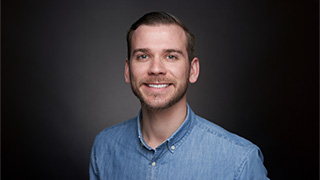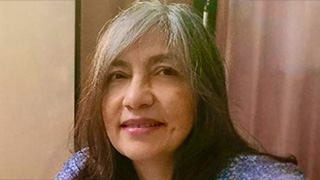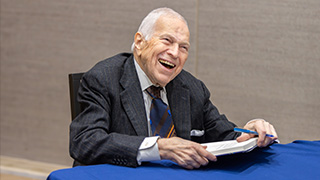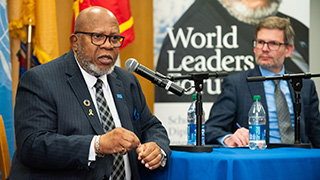Grad Students Participate in Real – World Negotiation Exercise
Thursday, March 9, 2023
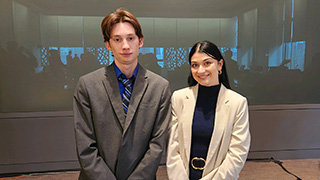
Erik Kacprzyk (M.A. ’23) and Allison Risewick (M.A. ’23).
During the last weekend of February 2023, two SHU Diplomacy grad students and one alum teamed up with students from NYU and Columbia to participate in the 8th annual Army War College and NYU’s Initiative for the Study of Emerging Threats International Strategic Crisis Negotiations Exercise. This year students focused on addressing the current situation in Cyprus while considering different governments’ interests in governance, power sharing, and economics. The exercise produced a peace agreement that guaranteed an impartial census to measure public sentiment and an economic package that opened Ercan Airport to international travel.
These negotiation exercises replicate real-world negotiations to develop peaceful solutions to security/conflict dilemmas. Previous crises and negotiated resolutions focused on the Artic Circle (in which then Diplomacy students Chimdi Chukwukere, M.A. ’22, and Lylian Pagan, M.A. ’22, participated), Syria, Nagorno-Karabakh, the South China Sea, Jammu-Kashmir, and the Korean Peninsula. This year, the War College suggested the unresolved conflict in Cyprus and allowed participants to rank which delegation (Turkey, Greece, the Republic of Cyprus, the Turkish Republic of Northern Cyprus, the US, and the UK) they wanted to represent. When the students arrived Friday afternoon, they received information detailing their countries and delegations' interests and refusals or "red lines" they could not cross. The end goal was to find a solution for Greek and Turkish Cypriots. Erik Kacprzyk (M.A. ’23) served on the Cyprus delegation, Allison Risewick (M.A. ’23) served on Turkey’s delegation, and Lylian Pagan (M.A. ’22) served on Greece’s delegation.
The two-day conference allowed SHU students to experience the nuances of diplomacy. In his reflection on the event, Erik outlined the formal conversations and negotiation sessions and the closed-door backchannel conversations that were equally important. On the first day, the Republic of Cyprus sacrificed its prepared introductory speech, instead choosing to protest the flag display. While the delegation stood by their decision, others viewed them as aggressive, and it was more challenging to schedule meetings. They went into the second day knowing they needed to recover the narrative and be proactive rather than reactive. Because of their work and the suggestions of war from the Turkish delegation, the Republic of Cyprus transformed its situation and engaged in fruitful conversations.
As a Turkic delegation member, Risewick provided further insight into its motivations. After a productive first day, the Turkish delegation went into the second day looking toward applying their recommendations. They, however, encountered exclusionary practices from their allies, specifically the U.S. and the U.K. Following a communication between the U.S. and the U.K. in which Turkey’s name was removed from the negotiation, Turkey needed to flex its muscles and remind its allies of its partnership and commitment to regional organizations such as NATO. That is precisely what they did, and while it did not work to their benefit as much, it did strengthen other delegations’ positions.
Pagan served as a member of the Greek delegation and detailed this experience in comparison to the negotiation exercise in 2020. When asked about her overall takeaways of this experience, she said, "I did the exercise in 2020, but it was online because of the pandemic, so the experience was completely different. This year was in person. From the beginning, I felt welcomed and part of the team. The information given to the team ahead of time was informative and prepared us to negotiate with other groups. In addition, our mentors helped us work through some issues and offered their expert advice."
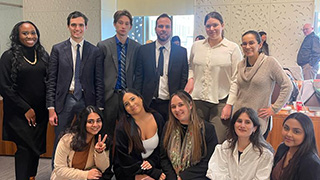
Cyprus Delegation with SHU graduate student Erik Kacprzyk.
Risewick provided more insight into the team formations, commending the other students for their desire to foster an inclusive environment filled with respect and cooperation. Risewick loved the intensity of the experience as it "made you feel like you were in an actual situation. You saw the different approaches to diplomacy where you have hundreds of ideas but only one decision. It was like a real-life prisoner's dilemma that we were acting out." Time flew by, and the students needed to change their positions and adapt positions immediately. Risewick and Kacprzyk were thankful they had taken Professor Zheng Wang’s Art and Science of Negotiation, as the readings helped them prepare for the exercise and Pagan cited her U.N. classes on Relevance and Reform and the Security Council and Professor Joseph Huddleston’s Causes of War.
Pagan strongly recommends this exercise for the networking and career opportunities it provides. Kacprzyk was thankful for the "edifying experience. You take what you learn. In classes, as you are doing your reading and writing your papers, it is an individual thing, but this was a way to stretch your muscles and practice what you’ve learned."
The School of Diplomacy thanks the Army War College and NYU’s Center for Global Affairs for extending the opportunity to our students.
Categories: Education, Nation and World


